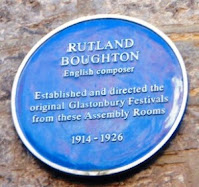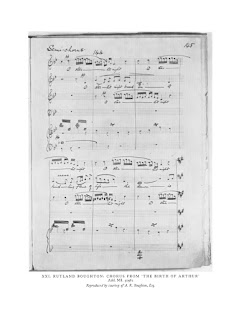In Memoriam Rutland Boughton - the "forgotten" composer
60 years ago on January 25th 1960 - just two days after his 82nd birthday - the composer Rutland Boughton died peacefully at the London home of his daughter Joy Boughton, who was an accomplished oboist herself. For the previous 30 years or so, however, he had been living in the small Gloucestershire hamlet of Kilcot, earning his upkeep as a smallholder during the day, whilst spending the nights composing and playing music together with his 3rd wife Kathleen and several of his eight children.
It is hard to imagine that almost four decades earlier he was at the zenith of his fame, when his Celtic druid-opera The Immortal Hour achieved the unprecedented run of 216 consecutive performances in London during 1922, with many more the following years - a record which still stands today!
Sadly this fate was not repeated with any of his other nine operas, despite his efforts to create a sort of "English Bayreuth" when he brought to life the original "Glastonbury Festivals" from 1914 - 26, making use of a small stage within the Assembly Rooms in the town centre. Here the composer replaced the orchestra with a grand piano and was busying himself as condutor, accompanist and even as a singer on stage. For this, he enlisted the help of his then partner Christina Walshe as a talented stage and costume designer.
The Festivals saw not only performances of Boughton's operas, but of some of his contemporaries' works, as well as Gluck's Iphigenia in Tauris and Purcell's Dido and Aeneas. In addition they featured ballet performances, chamber music recitals, workshops and lectures. Many influential people lent their support, one way or another, including Sir Thomas Beecham, Sir Edward Elgar, Ralph Vaughan Williams, the critic Edward J. Dent, who gave some lectures, the writer George Bernard Shaw - a lifelong friend of Rutland Boughton - and the renowned shoe manufacturers Clark from nearby Street in Somerset who were financially supporting the festival.
The downfall came in 1926 with an anti-establishment performance at Westminster of his 1915 Nativity opera Bethlehem, in support of the General Strike, which for the first time exposed the composer's affinity to the Communist Party and its ideals, when placing the Christ child in a miner´s cottage whilst King Herod resembled a tail-suited capitalist together with uniformed soldiers and policemen. Soon after, Boughton's former supporters began to withdraw the funds for his enterprise - the Glastonbury Festival Players - which lead inevitably to their liquidation.
Subsequently, Boughton, who was also a prolific writer and essayist, retired to his farm cottage at Kilcot where he took on a few commissions for magazine articles and organised occasional performances of his music, including several unsuccessful attempts to re-start his festivals. Royalties began to dwindle, financial hardship set in, and as a composer he was soon more or less forgotten. With few exceptions, even in our days, he is still only known to but a small number of music enthusiasts, to an extent that even the Promenade Concerts - now the BBC Proms - have not performed any of his works since 1953!
Luckily, triggered by the centenary of the composer´s birth and under the auspices of the newly founded "Rutland Boughton Music Trust", the first LP and later CD recordings started to emerge in the mid-1980s, proof of the commitment of Sir Edward Downes, who recorded the 2nd & 3rd Symphonies with the BBC Philharmonic Orchestra (BBC Radio Classics), and of Alan G. Melville, who recorded The Immortal Hour and Bethlehem (both Hyperion). Vernon Handley followed with the 3rd Symphony and the 1st Oboe concerto (Helios). In more recent years, the collection was enlarged when Ronald Corp committed The Queen of Cornwall (Dutton Epoch) to disc as well as the flute concerto and several pieces for string orchestra (Hyperion), Martin Yates three early symphonic poems, and Handley the 1st Symphony "Oliver Cromwell" (both Dutton Epoch). A recording of Boughton's late trumpet concerto is regrettably out of print.
Boughton's chamber music also attracted some recent CD recordings, with both string quartets (Helios), the works for oboe ("For Joyance", Oboe Classics), an album of songs (bms) and - just now - a piece for piano trio, the "Celtic Prelude" (Divine Art).
But what exactly had led to the long lasting demise of Boughton's popularity with so much of his oeuvre remaining unperformed? Likely, his rather uncompromising and commercially often unwise demands on publishers, performers and concert organisers; potentially, also his ideological roots in the Arts and Crafts movement paired with his communist believes, which had become very much out-of-vogue in most western societies after the emergence of the Soviet Union; but should there possibly be any musical reasons for so many of his works simply being overlooked, if not ignored? Certainly not!
Boughton's music is traditionally late romantic, full of melodic beauty and without any avant-gardist harmonic progressions. It is fundamentally British, albeit without the regal pomp of Elgar's popular pieces - more folkloristic indeed, yet without belonging to the English folksong movement like Holst, Vaughan Williams or E. J. Moeran. His choral settings are brilliantly virtuosic, his orchestration is colourful yet transparent and his handling of the solo voice expertly suited to the stage.
It is therefore difficult to comprehend that out of Rutland Boughton's lifetime achievement - the five music dramas of the so-called "Arthurian Cycle", mentioned in The Harvard Biographical Dictionary of Music and the Oxford Concise Dictionary of Music and subject to a handful of other articles and essays - only the first three have ever been performed, mainly by the composer himself as part of his Glastonbury Festivals.
According to Boughton's biographer Michael Hurd (1928 - 2006; Rutland Boughton and the Glastonbury Festivals, Clarendon Press, 1993), the latter two dramas suffer from the composer's own poor libretto and a musical quality which had fallen well below of that of his earlier operas. However, Hurd had arranged a complete stage performance of the third opera The Lily Maid in 1985; parts of it were broadcast and a 15 minute excerpt from the second act could still be listened to on certain internet forums until recently. The beauty of the music is breathtaking, and it illustrates the prominent role the chorus generally takes in Boughton's operas, based on the ancient Greek dramas.
Inspired by this experience, I endeavoured to study the large opening choral scene of the first drama The Birth of Arthur in both the handwritten orchestral score and the piano reduction, available in the archives of the British Library to where most of Boughton's manuscripts have been bequeathed by his heirs. Again, the atmospheric music of the scene - describing the morning mists upon the mystical "Lake of Wonder" - is unrivalled and begging to be heard by any music lover or opera buff!
As the Boughton trustees are currently not releasing the copyright, it may unfortunately yet be some time until these treasures can be published or performed, possibly even until 2039 when the copyright on manuscript scores generally expires. In addition, the 2nd act of The Birth of Arthur had never been orchestrated by the composer, however, this could be overcome just as it has been in other famous examples of 20th century operas (amongst others Berg - Cerha or Puccini - Alfano).
Until then, we will eagerly await - the sourcing of funds and the dedication of musicians permitting - any further recordings or performances of many a piece by Rutland Boughton still undiscovered today, nearly a century after his greatest successes. Hopefully, the Trust may meanwhile release some of the historic recordings and memorabilia held within their archives.
Alexander Kirsch,
25 January 2020
Alexander Kirsch,
25 January 2020
PS: Ian Boughton, the composer's grandson, has dedicated a Facebook page to his (famous) relative. This is currently the best source of up-to-date information, as the Trust's website has recently been shut down.





A short article written by the composer's grandson Ian R. Boughton: https://www.facebook.com/rutlandboughtonpromotions.uk/posts/2719535994794430
ReplyDeleteVisit the new website of The Rutland Boughton Music Trust.
ReplyDelete